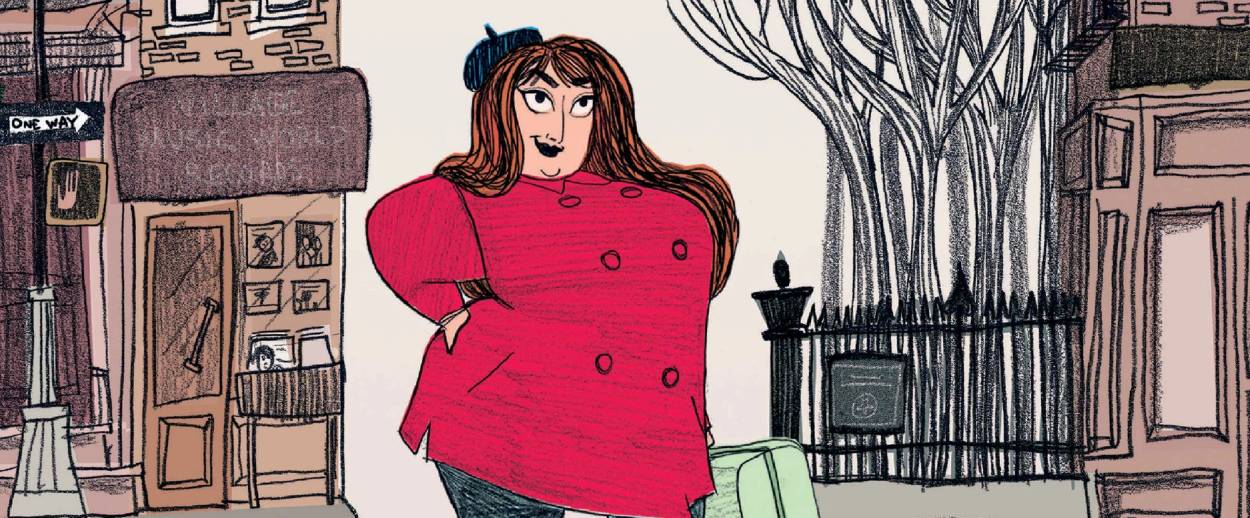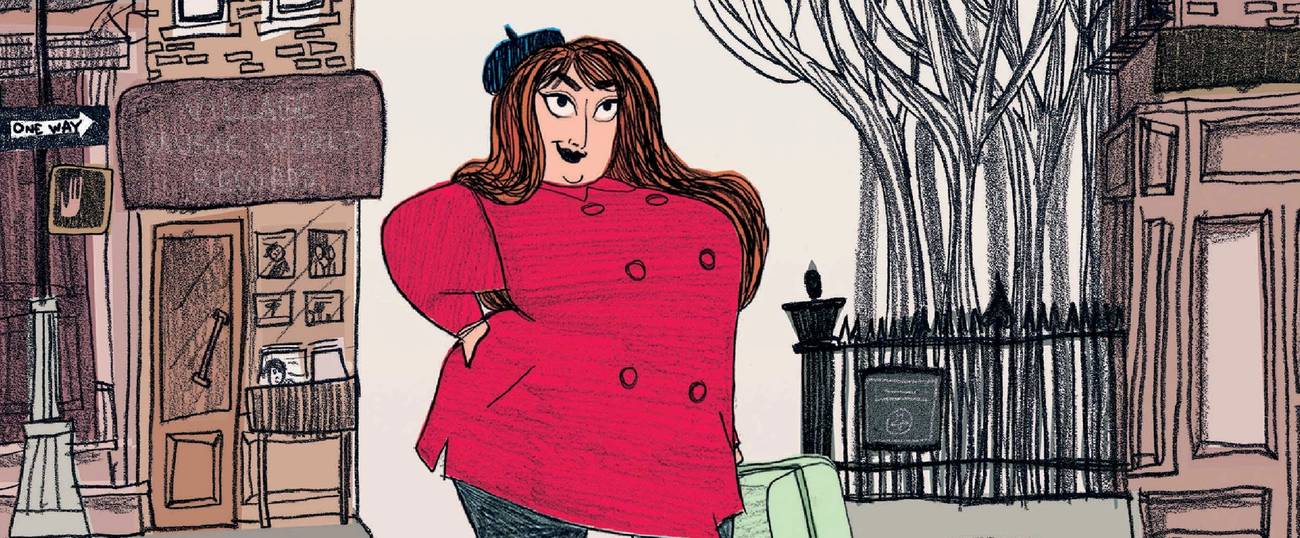Red Hot Mama
A graphic biography of singer Cass Elliot traces her journey from a kosher deli in Baltimore to the top of the pop charts




A new graphic bio (comic-book biography? graphic nonfiction history?) of The Mamas & the Papas singer Cass Elliot (neé Ellen Naomi Cohen) should bring the late star a lot of new fans. Written by French cartoonist Pénélope Bagieu and translated by Nanette McGuinness, California Dreamin’ focuses on Cass’s youth, starting in her infancy and ending just before the band’s breakup. It’s funny, sad, Jewy … and a little troubling.
One of the book’s quirks is that every chapter has a different narrator, and it’s not entirely clear which anecdotes and quotes are fabricated and which aren’t.
Chapter 1 opens with the Cohen family—baby Ellen, parents Bess and Philip, grandparents Chaya and Joseph—gathered around a radio, listening to a news report about the bombing of Pearl Harbor. “Grandpa Joseph is afraid there will be no more work, because in our family, we are left-wingers, or Jews, or union members, or I don’t know what,” says this chapter’s narrator, Ellen’s still-unborn sister Leah. The family owns a kosher deli, which Leah feels is foolish, “seeing as there weren’t any other Jews in Baltimore besides us.” (Already we’ve been set up to see that truth in this memoir depends on the teller, and memory is perhaps malleable.) Philip, we learn, is a dreamer, a man in fragile health, a fellow who loves opera and his children and is a little frightened of his powerful wife.
A chubby girl since childhood, Ellen is determined to become a star. A chapter narrated by her high school pal Ken Waissman conveys her feistiness, humor, and energy. The popular girls shun her, but Ken notes that even when left out, “she was left out with panache.” (Wearing heart-shaped glasses and carrying a lace parasol, Ellen invites the queen bees to her own party, airily telling them, “The theme is cheese and nudity! I’m counting on you!”) In a very funny succession of panels, we see Ellen wearing a full-body rabbit costume and a deadpan expression at the back of a classroom; cheerleading with pom-poms in the lunchroom—Bagieu draws her with huge boobs and belly, ironic eyebrows, and tiny elegantly pointed feet; slumped over a chemistry table, bug-eyed, clutching a beaker, while her prissy partner raises her hand and calls “MA’AM!! Can I change partners? Ellen’s pretending she poisoned herself AGAIN!”
Shirley, Ellen’s cynical voice instructor with a heart of gold (and a cigarette perpetually hanging out of her mouth) narrates a chapter about Ellen getting a job in the obituary section of the Baltimore Jewish Times to pay for singing lessons; Peggy is so impressed with her pupil’s talent that she winds up winds up teaching Ellen for free and giving her car to her so she can go to New York. Ellen’s adoring dad, dead at 42, narrates his chapter from his casket, kvelling, “She won’t be a deli Cohen.”
Ellen’s can-do spirit fuels the chapters about her becoming a singer, but Bagieu puts equal emphasis on the cruelty of her bandmates Denny Doherty and John Phillips. In Bagieu’s telling, John doesn’t want Cass in the band because he hates her size, even though her voice is infinitely better than that of his model girlfriend, Michelle. Like a puppy, Cass follows the band around despite John’s repeated insults; she pushes herself into a gig by getting a job as a waitress and harmonizing from the back of the room as John glares at her helplessly from the stage. John tells Denny, “The beautiful girl, the singer with the great voice, and the songwriter with his guitar. Three, Denny. As long as I live we’ll remain the trio with the perfect look. Cass is too … there. Too fat. Too everything.” (How very Sophie Tucker!)
Denny, meanwhile, leads Cass on. She crushes on him, and he flirts back, but it’s unclear whether he’s into her or not. And he doesn’t defend her to dictatorial John.
And Michelle, while friendly to everyone, is depicted as kind of dim. She says of Cass, “She only can exist through ambiguous friendships tinged with seduction, which automatically excludes women (me, in this case).” I couldn’t find sourcing for this quote anywhere, and it doesn’t square at all with Michelle’s stories of her and Cass’s mutual affection, or with Leah’s positive comments about Michelle, or with the fact that even after the band broke up, Michelle and Cass, by all accounts, stayed friends. Today, both Michelle and Leah maintain that the stories of Cass’s begging to be in the group were only John’s stories.
The book begins and ends with the group’s fans being interviewed for a radio show. The fans talk about how Cass is their favorite, how she’s so beautiful and talented … but at the same time, unbeknownst to them, Cass is sobbing over Denny sleeping with Michelle and the likely implosion of the band.
It’s an unfortunate place to stop the narrative, because we don’t learn how successful Cass became before her untimely death in 1974, at age 32. (Bagieu does include a playlist of her hits both as a Mama and as a solo act, for readers who want to go hunting on Spotify or YouTube.) We never find out that her song “Dream a Little Dream of Me,” which launched her as a solo artist, was a huge hit. Or that in just six years she guest-hosted The Tonight Show, recorded several albums, did tons of TV and movie appearances, and had a daughter whose father she refused to name. And ending the book before her death means there’s no opportunity to refute the oft-repeated, sizeist, anti-Semitic urban legend that she died by choking on a ham sandwich. (In reality, she died in her sleep, having eaten very little in the previous 24 hours … and contrary to another bit of gossip, there were no drugs in her system.) I missed meeting the Cass who sang Barry Mann and Cynthia Weil’s “Make Your Own Kind of Music,” a song that introduced her to a whole new audience when the song was prominently featured on the TV show Lost. On Lost, it was always associated with the lovelorn time traveler Desmond (“See you on the other side, brother!”) Hume; the joy, defiance, and freedom of the song contrasted with Desmond’s current circumscribed life, trapped on an island. My daughter Maxie was an infant when the show aired, and I used to sing it to her as a lullaby.
Nobody can tell you
There’s only one song worth singing
They may try and sell you
’Cause it hangs them up to see someone like you
But you’ve gotta make your own kind of music
Sing your own special song
Make your own kind of music
Even if nobody else sings along
It was the perfect match of artist and song. (Unlike, say “Monday, Monday,” the stupidity of which made Michelle and Cass break into giggle fits.) I also would have loved for the book to have noted that on the last night of her life, exhilarated after a triumphant series of solo concerts and standing ovations at the London Palladium, she called Michelle.
I was fascinated by the book’s very French-seeming ambivalence about Cass’s weight. Bagieu clearly disapproves of Cass’s mother forcing her to take diet pills (“I’m always just as hungry, except that also, I can’t fall asleep anymore,” she tells her pal Sharon, in what seems like awkward translation) and see therapist after therapist. For the most part, Bagieu illustrates Cass as a huge, powerful, sexy goddess, with boldly drawn, lush curves and sassy body language. (Michelle, on the other hand, is rendered in narrow lines, with hardly any pencil pressure, a barely-there wisp of a person. It’s artistically fun, but depicting the women as opposites—when in reality, both often aligned against John—feels reductive.) Sometimes the book seems to default to bad pop psychology—Cass ate too much because she was jealous of her new sister’s arrival!—and revels in the cliché of the awkward, lovelorn fat girl mooning over a dude too hot for her. Depicting Cass struggling to paint her own toenails seems like a too-easy joke.
But this makes me sound more critical of the book than I want to be. Treated as an art book rather than an artist’s biography, it’s a triumph. The cartooning is absolutely delicious. Bagieu’s black-and-white graphite pencil illustrations are lively and funny, and sometimes very beautiful. In one full-page panel, Cass and Denny drop acid on a tenement rooftop. Bagieu shows us the city at night, with its fire escapes and water towers and crown moldings, with the Chrysler Building and Empire State Building gleaming in the distance. Only a few windows in the city are illuminated, but there are bright white puffs, like snowflakes or stars or breaths of air in the cold, scattered everywhere—an effect of Cass’s giggly, drug-addled mind. Two unattributed thought balloons float at the bottom of the page; one says “heh heh heh” and the other says “grumble, grumble.” We don’t know which voice is Cass’s and which is Denny’s, a reflection of their teasing relationship.
I hope the book will make readers unfamiliar with Cass Elliot’s life seek out her music; her voice is the greatest story.
***
Like this article? Sign up for our Daily Digest to get Tablet Magazine’s new content in your inbox each morning.
Marjorie Ingall is a former columnist for Tablet, the author of Mamaleh Knows Best, and a frequent contributor to the New York Times Book Review.